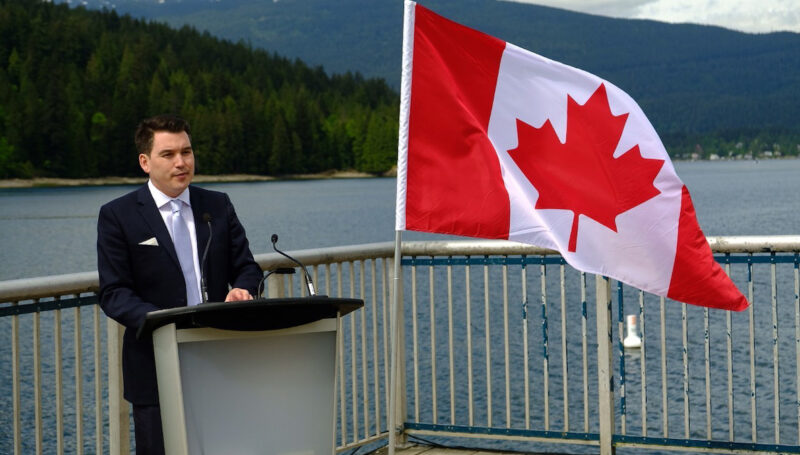‘Transition’ does not mean removing ocean salmon farms
“In British Columbia aquaculture is perfectly positioned to help drive economic growth,” – Terry Beech, Parliamentary Secretary to the Minister of Fisheries, on the future of salmon farms in BC.
By Fabian Dawson
SeaWestNews
The government’s pre-election pledge to transition open-net salmon farms in British Columbia’s waters, does not necessarily mean ousting fish farmers from the oceans to land-based operations, Canada’s Department of Fisheries and Oceans (DFO) has clarified.
The future of salmon farming in BC could involve a range of technologies including hybrid grow-out operations, closed and semi-closed containment systems in the ocean together with an area-based management approach, said Terry Beech, Parliamentary Secretary to the Minister of Fisheries.
“I know there are other systems that are ocean based…I know there are hybrid systems,” said Beech, after announcing an engagement process with First Nations, the aquaculture industry, and environmental stakeholders to deliver a solution for transitioning open-net pens in coastal BC waters.
“Our primary goal here is to transition away from open-net pens towards more sustainable technology. What that technology is, and what best fits for British Columbia for the near future, is part of what needs to be examined,” said Beech
“Part of going into a consultation, especially a meaningful consultation is not predetermining the outcome before you go ahead and have these engagements,” he said, in response to questions by SeaWestNews at a media briefing yesterday.
The clarification puts another dent into the campaigns by anti-fish farming activists who claim that the government will oust salmon farmers from BC’s coastal waters and replace them with land-based operations by 2025.
Canada’s Minister of Fisheries, Bernadette Jordan has already made it clear that 2025 is the date to “come up with a plan” and is not about getting all open-net salmon farms out of the ocean in five years.
The two clarifications follow a 2019 federal election campaign pledge by the Liberals to phase out ocean open-net salmon farming in B.C. by 2025.
Beech also defended DFO scientific studies that show salmon farms pose minimal threats to migrating wild stocks, which have been decried by anti-fish farm activists as “industry-influenced”. He urged all stakeholders to work together for a BC-based solution that will allow aquaculture to grow sustainably alongside efforts to replenish diminishing wild stocks.
“We are developing an aquaculture industry that will help grow our middle class, strengthen our environmental protection and position Canada as a global leader in sustainability.
“Both in our economy and in our diet aquaculture meets a clear and growing demand. Here in BC aquaculture is perfectly positioned to help drive economic growth,” he said.
His comments come in the wake of a new plan by BC salmon farmers to directly invest $1.4 billion in innovation, new technology and infrastructure, to boost Canada’s post pandemic recovery.
The investments through 2050 would create almost 10,000 new jobs and add a cumulative $44 billion in new economic activity to propel Canada’s Blue Economy, said a report by RIAS Inc., an independent economics consulting firm.
The report also outlines immediate steps to address misinformation about the industry while boosting investor certainty, including a clear call to federal and provincial governments to establish an agreed-upon fact guide and to develop predictable public policy for the industry.
“With a certain future, BC’s salmon farmers are ready to invest in rural coastal communities, creating opportunity for generations to come,” said John Paul Fraser, executive director of the BC Salmon Farmers Association.
“Innovation and transition is always something we’ve been focused on,” he said.
“Area-based management is a key transitional element that we’ve actually been pushing to government for a very long time, so we’re happy to see them moving on that.”
The latest innovative salmon farming technology to be introduced in B.C. is a new Semi-Closed Containment System (SCCS) by Cermaq Canada, that went operational this month at its Millar Channel farm site in Clayoquot Sound.
The new system will essentially eliminate lateral contact between wild and farmed salmon, – the central issue in the polarising debate over ocean-based fish farming in British Columbia.
“The SCCS allows for greater precision in farming by providing increased oversight of the environment inside the pen and by controlling water temperature, dissolved oxygen and preventing sea lice and algae from entering the system,” said David Kiemele, Managing Director for Cermaq Canada.
Other innovations being looked at include the ‘Egg’ closed-containment system, which involves growing salmon in semi-submerged tanks in the ocean, to prevent escapes and pathogen transfers from wild fish to farmed fish.
BC salmon farmers are also developing new land-based systems that will allow them to raise juvenile farmed salmon to larger, more robust sizes before transferring them to ocean-based grow-out systems.
This will significantly lower the length of time that the salmon spend in the ocean, thus effectively reducing production and environmental challenges related to sea lice infestation and potential interactions with wild salmon stocks.
Farmed Atlantic salmon is BC’s top seafood export with a total economic output of $1.6 billion. The industry currently supports nearly 6,500 full time jobs that pay 30% higher than BC’s median income.
Canada views aquaculture as a key component of the economy driven by sustainable, ocean resources, which accounts for about $31.65 billion annually in Canada’s Gross Domestic Product (GDP) and employs approximately 300,000 Canadians.
“I am looking forward to working collaboratively with our partners, on what the future of aquaculture could look like in British Columbia and I will be ensuring that all voices are heard,” said Minister Jordan, as part of yesterday’s stakeholder engagement announcement.
(File image of Terry Beech, Parliamentary Secretary to the Minister of Fisheries courtesy of DFO)

